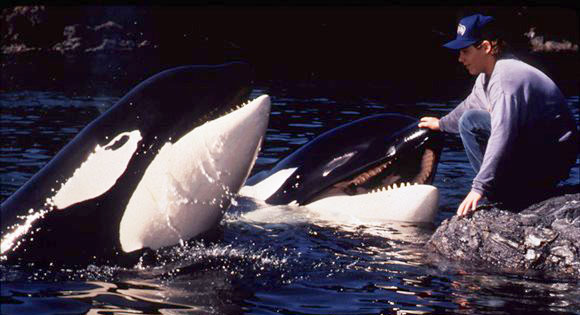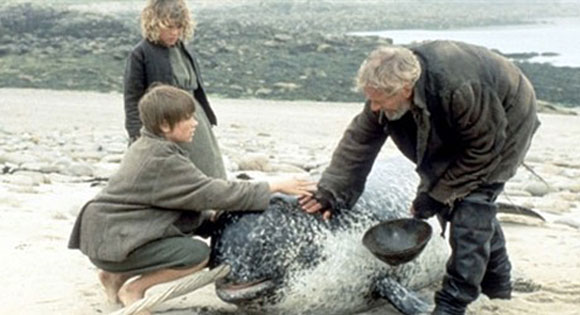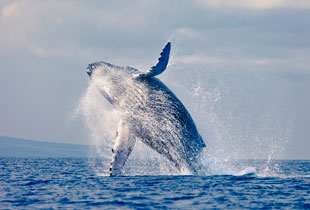- At the Edge of the World is gripping documentary about the courageous efforts of some disciplined and committed environmentalists to save the whales from being killed illegally by Japanese commercial fishing fleets. This film charts the 50-day Antarctic campaign with two ships patrolling the vast Ross Sea in search of Japanese whaling ships. There are 46 volunteers from around the world who are willing to risk their lives in the cold to save one whale in jeopardy.
- Big Miracle is a feature film based on a real-life incident in Alaska during the Cold War in 1988. The plight of three whales trapped beneath the ice turns into a media circus but compels us to measure our ideas and ideals about whales, the western threat to Eskimo life, and the positive things that can happen when opposing individuals and groups band together for a common cause.
- Blackfish is a riveting and thought-provoking documentary that offers a blistering critique of performing orcas in marine parks. In several emotionally gripping scenes, we sense the extreme cruelty of separating whale calves from their mothers as we hear the howls of the mothers' grief. While SeaWorld trainers were told to tell audiences that whales benefit from captivity, the truth is shown in footage of bleeding whales raked by the teeth of fellow captives. And instead of experiencing the freedom of swimming hundreds of miles in the wild, imagine being confined nearly two-thirds of your life in dark concrete pens for overnight safety.
- Earth is a beautifully filmed BBC documentary that marches through the seasons on Planet Earth. One segment follows a humpback whale and her calf who are making the long journey from tropical to Arctic waters. Watching Earth, we concur with Albert Schweitzer who said: "I cannot but have reverence for all that is called life."
- A Fierce Green Fire is an engrossing documentary that charts the incredible history of the environmental movement over the past 50 years. It admirably conveys the passion of many heroic individuals and groups to keep life on Earth flourishing. Act 3 of the film is about Greenpeace's campaigns to save the whales.
- Free Willy was a break-through feature film alerting the public to the plight of whales. These gigantic creatures have long symbolized the mystery and immense power of the animal kingdom, inspiring in humans a response of awe and fear. Only recently have they been seen as gentle giants, the singers of beautiful ocean ballads. This endearing drama explores the bond that forms between the troubled boy and an incarcerated orca in a marine park. They pay close attention to each other and are able to share their feelings. The film makes the point that whales belong in the wild. No matter how charming these animals might be as performers, humans must respect their right to reside outside our control in their own traveling communities.

- Free Willy 2: The Adventure Home continues to follow Willy and Jesse as they deepen their friendship and perform mutual acts of heroism. The message for youth comes across loud and clear: all creatures are fellow travelers and spiritual companions on Earth.
- Star Trek IV: The Voyage Home blends space fantasy with an ecology theme. On their way home to stand trial for stealing the Enterprise, the crew learns that an unidentified alien probe is threatening to destroy the earth by blocking the sun with a cloud cover. This mysterious spacecraft, they discern, is trying to communicate with whales, but unfortunately these mammals are extinct on twenty-third-century earth. Spock figures out a solution: time travel back to twentieth-century earth and bring back some whales to sing for the probe.
- Whale Rider is an astonishing New Zealand movie about the struggle of one ardent and determined young Maori girl to fulfill her destiny and find her true place among her people. In an extraordinary performance, Keisha Castle-Hughes as Pai conveys all her conflicting emotions. She uses solitude, silence, and prayer as practices to keep in touch with her ancestors and the whales that play a major role in the dramatically rich final segments of the film.
- When the Whales Came is an engaging English film that powerfully and practically speaks to the communal dimension of our responsibility to the natural world. The beaching of a whale pits a deaf man and his two friends against the greedy and self-centered instincts of the villagers.

More Films on Whales
